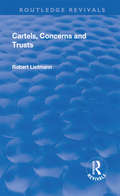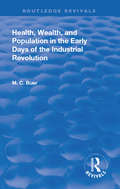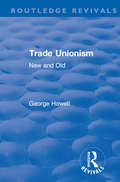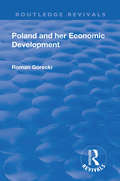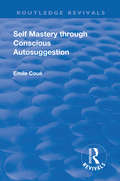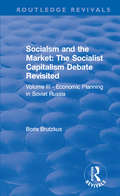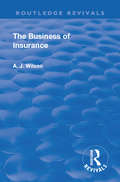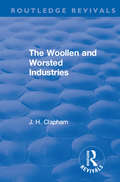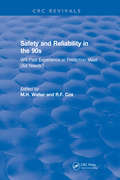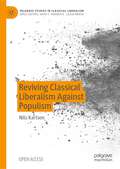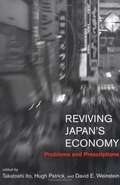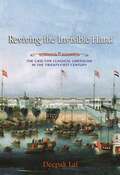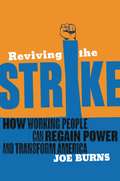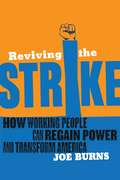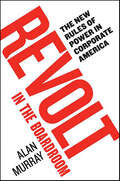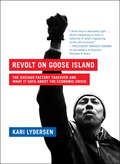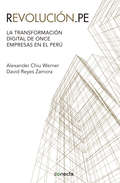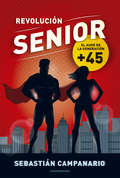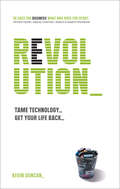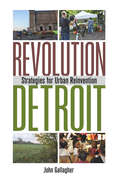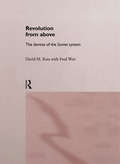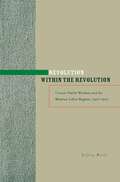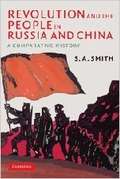- Table View
- List View
Revival: Cartels Concerns And Trusts (1932) (Routledge Revivals)
by Robert LiefmannThis volume makes available to English readers the best known and most frequently quoted study of industrial combination from the German point of view. There is an abundance of literature on the trusts, from economists who have lived close to that evolution, and the trusts, by their more challenging position, were for two decades the centre of the discussion which turned on what in industry was safe for democracy. Meanwhile, in Germany, the alternative of the cartel was having a less noticed a controversial development, until in Westphalia there was created, out of lower forms, a working model which was new and unique in the manner in which it related producers to each other and to the market. In only a few industries has this model been fully established; but it presents a rival type to the trusts, and places the problem of combination on a different basis of analysis and tendency. The distinction between these two forms may be a matter of industries, or of national law and psychology; or they may work together, the cartel being the general envelop within which fusions are created, the types are nevertheless distinct, so much so that ‘rationalization’, as a general term, rather denotes than defines them both. IN America, the Cartel is illegal, so that industry has sought its administrative solution in fusions; in England trusts and cartels co-exist; in Germany, they are interlaced, great trusts having their feet in one cartel, their shoulders in another and their heads in a third.
Revival: Health, Wealth, and Population in the early days of the Industrial Revolution (Routledge Revivals)
by Mabel Craven BuerThis book provides a comprehensive over view of eighteenth-century British medical reform, but as an economic historian, Buer considered the effect of diseases and medical intervention on population growth, not on medical ideas. Other optimistic views of the century either focused, like Buer, on the 'standard of living debate' or a related debate about the role (if any) of hospitals and public health measures in reducing mortality during the industrial revolution, giving only pasing attention to disease theory.
Revival: New and Old (Routledge Revivals)
by George HowellPublic approval of a book is indicated by its sale. A second edition of this having been exhausted, my publishers deem it advisable to issue a third edition revised to date. In assenting, I have had to examine it thoroughly in order to see whether the work required correction, and, if so, to what extent. After careful perusal I find no reason to modify any sentence, withdraw any expression, or correct any statement of fact in its pages. Much has happened since it was written in 1890, the proofs finally revised in January 1891, but in all respects my views are unchanged 3 nor have the last ten years Shown cause for any abandon ment of the opinions then held. My conclusions have proved sound in all instances, even where I ventured to predict. I have therefore left the text untouched except for a few verbal emendations, and the restoration of two pages (soa and 595) which were unaccountably dropped out in going through the press. All that I desire to add has been compressed into a Supplementary Chapter, in which the several controversial points are dealt with, and statistics are brought up to date. The book was written in the heat of controversies to which illusion is made, the somewhat severe criticisms being justified by the then facts and circumstances. If they now appear to be harsh, it is because the policy then denounced has been abandoned, or so modified as to be no longer open to the condemnation then pronounced.
Revival: Poland and her Economic Development (Routledge Revivals)
by Roman GoreckiThis richly illustrated and well documented book gives a full picture of the economic development of the Polish Republic during the seventeen years which elapsed since the independence of Poland was proclaimed by Marshal Pilsudski on October 11th, 1918. The author, in his capacity of President of the greatest and most important of Polish banks, proceeds from a description of the general conditions of the state of the country at the close of the great war, from which it suffered almost a complete destruction of economic resources, through an account of the work of reconstruction so brilliantly accomplished by the united efforts of the Polish nation, to a statement of the position as it is today. The author discusses concisely but adequately the national finances, banking, production, distribution, foreign and overseas trade, communications and transport and closes with an extremely interesting chapter on the measures which Poland undertook in order to overcome the crisis which overwhelmed world economy in 1930. Numerous diagrams and full index enhance the great usefulness of this work which should be indispensible to the banker, maunfacturer, and trader, contemplating business with Poland, and to all students of economics and international affairs.
Revival: Self Mastery Through Conscious Autosuggestion (Routledge Revivals)
by Emile CoueSuggestion, or rather Autosuggestion, is quite a new subject, and yet at the same time it is as old as the world. It is new in the sense that until now it has been wrongly studied and in consequence wrongly understood; it is old because it dates from the appearance of man on the Earth. In fact, autosuggestion is an instrument that we possess at birth and in this instrument, or rather in this force, resides a marvellous and incalculable power, which according to circumstances produces the best or the worst results. Knowledge of this force is useful to each one of us, but it is peculiarly indispensable to doctors, magistrates, lawyers, and to those engaged in the work of education. By knowing how to practice it consciously it is possible in the first place to avoid provoking in others bad auto-suggestions which may have disastrous consequences, and secondly, consciously to provoke good ones instead, thus bringing physical health to the sick, and moral health to the neurotic and the erring, the unconscious victims of anterior autosuggestions, and to guide into the right path those who had a tendency to take the wrong one.
Revival: Socialsm and the Market (Volume III) (Routledge Revivals)
by F. A Hayek Boris BrutzkusThe ideas set forth in these pages matured in the authors mind during the early years of constructive communism in Petrograd. The communist government, intoxicated by its successes in the counter-revolution, had promised to deal promptly with all economic problems now that its hands where free to do so. It was at this moment of its greatest triumphs that the author put forward his contention that the system of Marxian communism, as then conceived, was-intrinsically unsound and must inevitably break down.
Revival: The Business of Insurance (Routledge Revivals)
by Alexander Johnstone WilsonThis little book is in no sense intended to be of use to insurance experts. It is written by an outsider mainly for the ignorant, for the multitude who either wish to insure their lives, or to whom the insurance agent is for ever coming with his proposals, his promises and blandishments. My doctrine is that every man ought to insure his life the moment he arrives at a period or position when his responsibility extends over the lives of others. If this duty were regarded as an imperative one by the community at large, there would be little or no necessity for the elaborate machinery required by our life offices to induce people to invest in life or other insurance policies; but as long as apathy prevails, such agencies must be maintained and a ceaseless activity displayed by the offices in tempting investors to enter into policy contracts.
Revival: The Woollen and Worsted Industries (Routledge Revivals)
by J. H. ClaphamAn overview of the woollen and worsted industries in England in the 1900s.
Revival: Will past experience or prediction meet our needs? (CRC Press Revivals)
by M.H. Walter R.F. CoxReliability-based design is relatively well established in structural design. Its use is less mature in geotechnical design, but there is a steady progression towards reliability-based design as seen in the inclusion of a new Annex D on "Reliability of Geotechnical Structures" in the third edition of ISO 2394. Reliability-based design can be viewed as a simplified form of risk-based design where different consequences of failure are implicitly covered by the adoption of different target reliability indices. Explicit risk management methodologies are required for large geotechnical systems where soil and loading conditions are too varied to be conveniently slotted into a few reliability classes (typically three) and an associated simple discrete tier of target reliability indices.
Reviving Aleppo: Urban, Legal and Digital Approaches for Post-War Recovery (Cities, Heritage and Transformation)
by Fabian Thiel Rahaf OrabiThis book provides indispensable and interdisciplinary insights into the revitalization and redevelopment of urban centers in war-stricken conflict regions, such as Aleppo in northern Syria. This contribution explores innovative, cutting-edge toolkits for academicians, digital building technologists, engineers, architects, archeologists, (urban) planners, land policy advisors and legal scholars. The compendium not only analyzes strategies and shortcomings of implementation guidelines drawn by donor organizations, development agencies and political actors, but also explores possibilities for initiating functioning and sustainably resilient networks that can establish capacity-building platforms for recovery and reconstruction. Although the work focuses on a city in Syria, it holds lessons, toolkits and instruments for other areas in the region and beyond.
Reviving Classical Liberalism Against Populism (Palgrave Studies in Classical Liberalism)
by Nils KarlsonThis open access book by Nils Karlson explores the strategies used by left- and right-wing populists to make populism intelligible, recognizable, and contestable. It presents a synthesized explanatory model for how populists promote autocratization through the deliberate polarization of society. It traces the ideational roots of the core populist ideas and shows that these ideas form a collectivistic identity politics. Karlson argues that to fight back requires the revival of liberalism itself by defending and developing the liberal institutions, the liberal spirit, liberal narratives, and liberal statecraft. The book also presents and discusses an extensive list of counterstrategies against populism. Written within the tradition of political theory and institutional economics, this book uses a wide variety of sources, including results and analyses from social psychology, ethics, law, and history.
Reviving Japan's Economy: Problems and Prescriptions
by Takatoshi Ito Hugh Patrick David E. WeinsteinAnalysis and policy prescriptions for Japan's sustained economic recovery from its 14-year malaise by 15 top American and Japanese experts on the subject.
Reviving the Invisible Hand: The Case for Classical Liberalism in the Twenty-first Century
by Deepak LalReviving the Invisible Hand is an uncompromising call for a global return to a classical liberal economic order, free of interference from governments and international organizations. Arguing for a revival of the invisible hand of free international trade and global capital, eminent economist Deepak Lal vigorously defends the view that statist attempts to ameliorate the impact of markets threaten global economic progress and stability. And in an unusual move, he not only defends globalization economically, but also answers the cultural and moral objections of antiglobalizers. Taking a broad cross-cultural and interdisciplinary approach, Lal argues that there are two groups opposed to globalization: cultural nationalists who oppose not capitalism but Westernization, and "new dirigistes" who oppose not Westernization but capitalism. In response, Lal contends that capitalism doesn't have to lead to Westernization, as the examples of Japan, China, and India show, and that "new dirigiste" complaints have more to do with the demoralization of their societies than with the capitalist instruments of prosperity. Lal bases his case on a historical account of the rise of capitalism and globalization in the first two liberal international economic orders: the nineteenth-century British, and the post-World War II American. Arguing that the "new dirigisme" is the thin edge of a wedge that could return the world to excessive economic intervention by states and international organizations, Lal does not shrink from controversial stands such as advocating the abolishment of these organizations and defending the existence of child labor in the Third World.
Reviving the Strike
by Joe BurnsIf the American labor movement is to rise again, it will not be as a result of electing Democrats, the passage of legislation, or improved methods of union organizing. Rather, workers will need to rediscover the power of the strike. Not the ineffectual strike of today, where employees meekly sit on picket lines waiting for scabs to take their jobs, but the type of strike capable of grinding industries to a halt-the kind employed up until the 1960s.In Reviving the Strike, union negotiator Joe Burns draws on labor economics, history, and current analysis to show how only a campaign of civil disobedience can overcome an illegitimate system of labor control that has been specifically constructed over the past thirty years to reign in the power of the American worker. The book challenges prevailing views within the labor movement that say that tactics such as organizing workers or amending labor law can resolve the crisis of the American worker. Instead, Reviving the Strike offers a fundamentally different solution to the current labor crisis, showing how collective bargaining backed by a strike capable of inflicting economic harm upon an employer is the only way for workers to break free of the repressive system that has been inflicted upon them for the past three decades.Joe Burns is a veteran union negotiator and labor lawyer, and a former local union president. For the past decade, he has negotiated labor contracts in the airline and health care industries. He has a law degree from the New York University School of Law.
Reviving the Strike: How Working People Can Regain Power and Transform America
by Joe BurnsIn Reviving the Strike, Joe Burns draws on economics, history and current analysis in arguing that the labor movement must redevelop an effective strike based on the now outlawed traditional labor tactics of stopping production and workplace-based solidarity.
Revolt in the Boardroom: The New Rules of Power in Corporate America
by Alan MurrayThroughout the 20th century, American corporations were governed by autocratic, almost unaccountable chief executives. Their word was law and the only check on their power was a board of directors composed of their friends and allies.Then, in a stunning reversal, a momentous series of firings deposed the heads of some of the world's best-known companies: AIG, Morgan Stanley, Boeing, Hewlett-Packard and Pfizer, just to name a few. Formerly unchallenged CEOs found themselves under fire, often from their own handpicked boards. The number of deposed executives is astonishing. In 2004, the leaders of 600 companies were asked to leave. That number more than doubled in 2005 and reached 1,400 companies in 2006.Flexing new muscles, directors are assuming new and unfamiliar responsibilities. In Revolt in the Boardroom, Alan Murray reveals the inner workings of the new seat of power. Using the access afforded to him by his influential Wall Street Journal column, Murray tells the story of three seminal board revolts—the now-famous Hewlett-Packard drama, the ousting of Boeing's Harry Stonecipher and the end of the reign one of the world's most autocratic executives, Hank Greenberg at AIG.Murray goes further to chart the history of the corporation, the rise of governance and the effects of the new power gained by outside institutions like hedge funds and interest groups. Through it all, Murray shows how the job of chief executive has rapidly and permanently changed. Leaders like A. G. Lafley and Jeff Immelt govern instead of rule, build alliances and support instead of dictating direction and pay careful attention to a broader range of stakeholders than ever before.Revolt in the Boardroom is the first look at the new world of corporate power and the last word on the transformational events of the last two years.
Revolt on Goose Island
by Kari LydersenRevised and updated, with a new afterword by the author"There is much talk about 'audacity' these days, but true chutzpah is when the workers take over the factory and take on the bank. Kari Lydersen's invaluable account of the Republic sit-down strike is an instruction manual for worker dignity."--Mike Davis, author of Buda's Wagon and City of QuartzDecember 5, 2008: It wasn't supposed to work like this. Days after getting a $45 billion bailout from the U.S. government, Bank of America shut down a line of credit that kept Chicago's Republic Windows & Doors factory operating. The bosses, who knew what was coming, had been sneaking machinery out in the middle of the night. They closed the factory and sent the workers home.Then something surprising happened: Republic's workers occupied the factory and refused to leave.Kari Lydersen, an award-winning reporter, tells the story of the factory takeover, elegantly transforming the workers' story into a parable of labor activism for the twenty-first century, one that concludes with a surprising and little-reported victory.From the Trade Paperback edition.
Revolucion.pe: La transformación digital de once empresas en el Perú
by Alexander Chiu Werner David Reyes ZamoraLas claves para afrontar con éxito la transformación digital ¿El conocimiento de las tecnologías y tendencias a futuro basta para producir una transformación digital? ¿Cuánto valor le puede dar el design thinking a una empresa? ¿Es posible reinventar un modelo de negocio mientras se intenta preservar el anterior? ¿Es imprescindible un cambio de mindset en los líderes y colaboradores de una empresa para innovarla? ¿Qué herramientas de la era digital regirán el mañana? En Revolución.pe, Alexander Chiu Werner y David Reyes Zamora diseccionan las estrategias detrás de la transformación digital de once empresas en el Perú en base a cuatro dimensiones clave de una organización -cultura, insights, organización y tecnología- y exponen, caso a caso y a profundidad, el significado de innovación. Aunque no hay una fórmula única que garantice el éxito, las diferentes historias empresariales coinciden en generar la urgencia de tomar acción y presentar las herramientas estratégicas que encaminarán a las empresas al desafío digital.
Revolución senior: El auge de la generación + 45
by Sebastián CampanarioSebastián Campanario cuenta de qué modo los +45 tendrán un lugar protagónico en los próximos años. Una propuesta original y disruptiva, que da las claves para deconstruir nuestros prejuicios etarios y entender los huracanes de cambio que estamos atravesando. ¿Solo los jóvenes son creativos e innovadores? ¿Qué podrían hacer las empresas y los gobiernos para dejar de ver los años como un problema y aprovechar su potencial económico? ¿A qué edad, realmente, uno considera que los demás son viejos? Así como sucedió con el debate de género, crece la conciencia sobre el estigma de valores negativos atribuidos a la vida adulta. El advenimiento de los primeros millennials cincuentones no está lejos, así que las economías se están replanteando su relación con los mayores de esa edad. Sebastián Campanario cuenta de qué modo los +45 tendrán un lugar protagónico en los próximos años, y da las claves para deconstruir nuestros prejuicios etarios y entender los huracanes de cambio que estamos atravesando. Mitos, estadísticas y testimonios en torno a la generación senior en la era de la inteligencia adaptativa. Paso a paso, cómo será "el contraataque de los clásicos", en uno de los libros más disruptivos y originales.
Revolution
by Kevin DuncanElectronic + Addicted (abnormally dependent on a habit) = edicted (hooked on technology).Technology can be a wonderful thing. It can also be a curse when it overwhelms us. If your phone, computer or other devices are beginning to rule your life, then you may be edicted.We don't have to be ruled by our machines. It's time for us humans to fight back. Revolution tells you how, with technology taming tips and simple things that you can do to regain control. Take the test and find out just how edicted you are - then learn how to cure yourself.'I can't talk now, I'm on the phone'For those of us suffering from ediction, it's time to pause and think. Author and Plain English commentator Kevin Duncan has trained and advised some of the UK's top companies, including Saatchi & Saatchi and Shell, in how to cope with all this. This thought-provoking book grapples with just how addicted we have become to technology and offers a set of ideas to help wean us off our technological drugs and lead a more fulfilling life. It looks briefly at how we got here, tests you on how serious your condition is and then offers real solutions, including rapid sequential tasking (v multitasking), communicating concisely, using the best method of communication for the job, all while retaining your sense of humour and enthusiasm.""Every page is a prompt to imagine things differently. A handbook for these challenging times ahead.""Mark Earls, author of Herd'He does for business what Nike does for sport.'Richard Hytner, Deputy Chairman, Saatchi & Saatchi Worldwide'Anyone who owns a mobile should have this on their shelf.'Robert Ashton, author The Life Plan
Revolution Detroit: Strategies for Urban Reinvention
by John GallagherAfter decades of suburban sprawl, job loss, and lack of regional government, Detroit has become a symbol of post-industrial distress and also one of the most complex urban environments in the world. In Revolution Detroit: Strategies for Urban Reinvention, John Gallagher argues that Detroit's experience can offer valuable lessons to other cities that are, or will soon be, dealing with the same broken municipal model. A follow-up to his award-winning 2010 work, Reimagining Detroit, this volume looks at Detroit's successes and failures in confronting its considerable challenges. It also looks at other ideas for reinvention drawn from the recent history of other cities, including Cleveland, Flint, Richmond, Philadelphia, and Youngstown, as well as overseas cities, including Manchester and Leipzig. This book surveys four key areas: governance, education and crime, economic models, and the repurposing of vacant urban land. Among the topics Gallagher covers are effective new urban governance models developed in Cleveland and Detroit; new education models highlighting low-income-but-high-achievement schools and districts; creative new entrepreneurial business models emerging in Detroit and other post-industrial cities; and examples of successful repurposing of vacant urban land through urban agriculture, restoration of natural landscapes, and the use of art in public places. He concludes with a cautious yet hopeful message that Detroit may prove to be the world's most important venue for successful urban experimentation and that the reinvention portrayed in the book can be repeated in many cities. Gallagher's extensive traveling and research, along with his long career covering urban redevelopment for the Detroit Free Press, has given him an unmatched perspective on Detroit's story. Readers interested in urban studies and recent Detroit history will appreciate this thoughtful assessment of the best practices and obvious errors when it comes to reinventing our cities.
Revolution From Above: The Demise of the Soviet System
by David Kotz Fred WeirControversially this book argues that the ruling party-state elite in the USSR itself moved to dismantle the old system. Topics discussed include: * the beginnings of economic decline in 1975 * Gorbachev's efforts to democratize and decentralize * the complex political battle through which the coalition favouring capitalism took power * the flaws in economic policies intended to rapidly build capitalism * the surprising resurgence of Communism. Research includes interviews with over 50 former Soviet government and Communist party leaders, policy advisors, new private businessmen, trade union leaders and intellectuals.
Revolution Within the Revolution
by Jeffrey BortzMexico's revolution of 1910 ushered in a revolutionary era: during the twentieth century, Mexican, Russian, Chinese, Cuban, Nicaraguan, and Iranian revolutions shaped local, regional, and world history. Because Mexico was at the time a rural and agrarian country, it is not surprising that historians have concentrated on the revolution in the countryside where the rural underclass fought for land. This book uncovers a previously unknown workers' revolution within the broader revolution. Working in Mexico's largest factory industry, cotton textile operatives fought their own fight, one that challenged and overthrew the old labor regime and changed the social relations of work. Their struggle created the most progressive labor regime in Latin America, including but not limited to the famous Article 123 of the 1917 Constitution. Revolution within the Revolution analyzes the rules of labor and explains how they became a pillar of the country's political system. Through the rest of the twentieth century, Mexico's land reform and revolutionary labor regime allowed it to avoid the revolution and repression experienced elsewhere in Latin America.
Revolution and Change in Central and Eastern Europe: Political, Economic and Social Challenges
by Minton F. GoldmanHow this bloc of countries developed during the twentieth century.
Revolution and the People in Russia and China
by S. A. SmithA unique comparative account of the roots of Communist revolution in Russia and China. Steve Smith examines the changing social identities of peasants who settled in St Petersburg from the 1880s to 1917 and in Shanghai from the 1900s to the 1940s. Russia and China, though very different societies, were both dynastic empires with backward agrarian economies that suddenly experienced the impact of capitalist modernity. This book argues that far more happened to these migrants than simply being transformed from peasants into workers. It explores the migrants' identification with their native homes; how they acquired new understandings of themselves as individuals and new gender and national identities. It asks how these identity transformations fed into the wider political, social and cultural processes that culminated in the revolutionary crises in Russia and China, and how the Communist regimes that emerged viewed these transformations in the working classes they claimed to represent.
